I think Shabbat is an aspiration.
I think Shabbat is also a brilliant, healing, gracious gift from our tradition.
But for most modern Jews, Shabbat is also not a given. They/we “aspire” to the possibility of a day set aside. They/we pretty much know what the world might feel like if we could enter the “Gates of Shabbat,” but it somehow doesn’t quite happen as much as we might wish it to be so.
All this is why I’ve taken a journey over the last few years along with several colleagues and friends to revise the book, Gates of Shabbat, which I helped create back in 1991.
To be honest, when Rabbi Hara Person first asked if I wanted to revisit Gates of Shabbat, I wasn’t sure what else to say about Shabbat that wasn’t already in the existing text.
Then I began to think and I realized that, although Shabbat remains Shabbat, the world around Shabbat has changed substantially in these last 25 years. A changed world has to inspire new ways to engage the seventh day, and that is what emerged as Gates of Shabbat, Version 2.0…Version 2016 took shape.
Here are a few of the developments that my committee and I responded to as we developed the new book.
First, we noted that technology has transformed our lives in ways we couldn’t have anticipated years ago. If we were “busy” in 1991, we are busier still today. We are plugged in 24/7. We are bombarded with news and connections to the world that have a life of their own. Is it for good or is it all for bad? I won’t tell you how we resolved the issue, but the new Gates of Shabbat does address the critical intersection of Shabbat and electronics.
Here’s a related development. As a result of the Internet, we communicate differently. A new kind of “literature” has developed. People blog. People tell stories. People share first-person narratives about their experience in ways that were not a part of our lives earlier. The new Gates of Shabbat will do the same. We have assembled fourteen original reflections from both laypeople and rabbis. Each small essay offers readers a new and personal way of encountering Shabbat.
And, of course, the world has changed insofar as new family constellations have become part of the landscape. As expected, the new Gates of Shabbat will speak to those who are married with children, but it will also speak to households without children, to same-sex couples, to singles, and to a new growing population – those who are retired. Here is a question that just didn’t occur to us 25 years ago: What does Shabbat mean for retirees who are more less “free” every day?
Finally, these last 25 years have seen a new dimension of Jewish life emerge. Or to put it more accurately, during these last few decades our liberal Jewish world has shown renewed interest in classic matters like spirituality and faith. Meditation and mindfulness are part of our new vocabulary. As a result, the new Gates of Shabbat introduces texts from Chasidic literature. Readings from Rabbi Nachman of Bratzlav and Rabbi Zalman Schachter-Shalomi are part of the mix. You can even find several places in the new book entitled, Creating Holy Moments. They are designed to help readers slow down and cultivate a deeper sense of k’dushah in Shabbat.
****
All in all, I hope Gates of Shabbat 2016 brings something refreshing and important to the search for Shabbat. I believe the book can speak to vatikim because it contains what was best about the earlier volume along with the innovations mentioned above plus some wonderful new texts and readings. I believe too that the book will read well for those who are considering the seventh day for the very first time.
Personally, I love the book because, among its many offerings, I continue to be moved by two very brief poems that capture my sense of Shabbat’s magic.


—
Mark Shapiro is Rabbi Emeritus of Sinai Temple in Springfield, MA. He is the editor of Gates of Shabbat, which is now available for pre-order and will be ready in time for Fall Classes.



One reply on “Aspiring to Shabbat: Gates of Shabbat Revised”
Yishar kochacha Mark! Kol haKavod!
Shelly Zimmerman